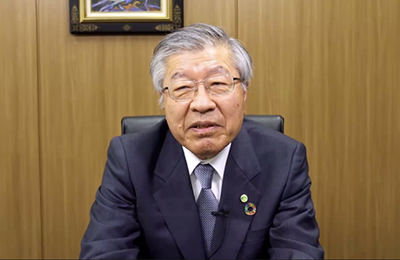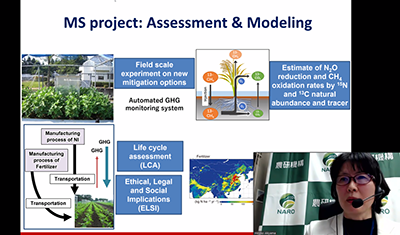On Monday, March 1, 2021, the international symposium "Cool Earth via Microbes in Agriculture", which was co-organized by NEDO*, Tohoku University, and NARO, was held online.
*NEDO: New Energy and Industrial Technology Development Organization
NEDO is pursuing ambitious research and development activities to achieve the goal-4 of the 'Moonshot Research & Development Program' (hereafter MS program), which is coordinated by the Cabinet Office of Japan. As one of the projects, Tohoku University and NARO launched "Mitigation of Greenhouse Gas Emissions From Agricultural Lands by Optimizing Nitrogen and Carbon Cycles (dSOIL)" in 2020, and Prof. Kiwamu Minamisawa of Tohoku University was appointed as the Project Manager (PM).
Additionally, several soil-related studies of the EU's Research and Innovation Programme 'Horizon Europe' are currently being implemented as the 'SOIL' Project of the European Joint Program (hereafter EJP-SOIL).
This online symposium had 542 participants from more than 27 countries and aimed to share the goals of the above projects and the research trends on mitigating greenhouse gas (GHG) emissions from agricultural lands by several leading international research institutes. It also aimed to promote the strengthening of international cooperation (especially between France and Japan) regarding innovative research designed to optimize carbon and nitrogen cycling via microbes in agriculture as outlined in the theme "Cool Earth - Stop Global Warming".
The symposium was declared open by Prof. Kiwamu Minamisawa and Dr. Laurent Philippot of the French National Research Institute for Agriculture, Food and Environment (INRAE). At the opening ceremony, Dr. Kenji Yamaji (Program Director, MS Goals 4 & Senior Vice President, Director-General, Research Institute of Innovative Technology for the Earth, Japan), Dr. Jean-Francios Soussana (Vice-President of the INRAE, France), and Dr. Kazuo Kyuma (President of NARO) gave the welcoming addresses, followed by the opening remarks given by Dr. Motoko Kotani, Executive Vice President for Research, Tohoku University, Japan.
In the welcome remarks, Dr. Kazuo Kyuma, President of NARO, introduced the organization's efforts in the dSOIL project and stated that he hoped the symposium would strengthen cooperation among researchers and contribute to solving global warming issues.
In the main session, seven researchers from INRAE, Spanish Institute for Agricultural Research, Tohoku University, NEDO, and NARO, gave lectures on the latest research on the development of technologies to mitigate GHGs by microbes and soil management, which are being conducted in the dSOIL and EJP-SOIL projects. The lectures were followed by various questions by commentators and a Q & A conducted over Zoom, and a lively exchange of opinions occurred.
In her lecture, Dr. Hiroko Akiyama of NARO introduced new measures to reduce emissions of N2O and methane from agricultural lands in addition to the conventional N2O mitigation technology using coating fertilizer and nitrification inhibitor. The new measures include inoculation of the rhizobial strain (nosZ+/nosZ++) with high N2O removal ability, which will be conducted in the dSOIL project. Responding to queries, Dr. Hiroko Akiyama answered that incentives such as carbon credit systems are necessary to promote the introduction of GHG mitigation technology.
In the closing remarks, Prof. Kiwamu Minamisawa stated that starting with this symposium, the dSOIL project will contribute to solving the issue of global warming by promoting cooperation through large-scale projects such as EJP-SOIL.
INRAE also introduced the mutual exchange program "Joint Linkage Call (JLC)" with NARO aiming to strengthen mutual collaboration.







